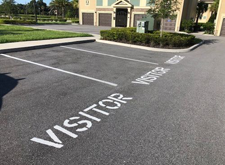 *New Case Law
*New Case Law
The Court of Appeals recently ruled in Issakhani v. Shadow Glen Homeowners Association, Inc. (2021) 63 Cal.App.5th 917, that homeowners associations do not have a duty of care to provide onsite parking to invitees. In that case, a pedestrian was struck by a car when jaywalking across a five-lane highway at night. The pedestrian was visiting her friend, who lived in a condominium project. The pedestrian decided to park across the street because the complex did not have any guest parking spots available.
The pedestrian sued the condominium owners association (“association”) for negligence and premises liability on the basis that the association did not have enough onsite guest parking spaces. The pedestrian argued that the association was liable because the association’s failure to maintain the “required” number of guest spots created a foreseeable risk of harm to the association’s guests.
The association moved for summary judgment, and the trial court granted the association’s motion. The Court of Appeals agreed and ruled that the association, as the landowner, did not owe a duty of care to invitees to provide adequate onsite parking.
Common Law Duty of Care
A “duty of care” exists when a person has a legal obligation to prevent harm to another person. If that person breaches his or her duty, then that person is subject to liability. A duty of care can arise under either the common law or through legislative enactments (i.e., statutes).
The common law requires landowners to maintain their properties in “reasonably safe conditions.” This duty also requires landowners to ensure that the maintenance of their land does not expose others to unreasonable risk of offsite injuries. In other words, landowners may be required to protect invitees against offsite injuries, if those offsite injuries are caused by alleged onsite deficiencies.
To determine whether the association owed a duty of care to the pedestrian in this case, the Court of Appeals looked to existing California caselaw.
California courts have historically refused to impose a duty of care on landowners to provide onsite parking in order to protect invitees from the dangers of crossing nearby streets. In the most recent case of Vasilenko v. Grace Family Church (2017) 3 Cal.5th 1077, the California Supreme Court held that landowners are not required to provide onsite parking for invitees.
As such, the Court of Appeals ruled that the common law duty of care does not require a landowner to provide onsite parking to invitees in order to protect those invitees from traffic accidents occurring offsite. Therefore, the association did not owe a duty of care toward the pedestrian in this case.
Statute-Based Duty of Care
A duty of care can also stem from a statute or ordinance enacted by the legislature. The pedestrian argued that the association owed her a duty of care by virtue of the guest parking requirements set forth in City of Los Angeles Ordinance No. 151,411 (“Ordinance”). The Ordinance required that the association maintain 34 guest parking spaces. The pedestrian argued that the association violated its statute-based duty of care since the association only had 6 guest parking spots.
Statutes and ordinances can create duties of care giving rise to negligence claims when they set forth generally applicable, “fundamental policy decisions.” However, a duty of care arises in those cases only when the person invoking the statute-based duty of care is a member of the class of persons that the statute was designed to protect, and when the harm suffered by the person invoking the statute-based duty of care is the type of harm that the statute was designed to prevent.
In this case, the Court of Appeals found that the Ordinance did not embody a generally applicable fundamental policy decision, because the Ordinance only applied to a single parcel of property. The Ordinance was simply a result of an internal, parcel-specific administrative review initiated by the developer to rezone the parcel of land.
Even if the Ordinance were found to embody a fundamental policy decision, the Court of Appeals explained that it was not designed to protect invitees from offsite traffic accidents. Instead, the Ordinance was part of a rezoning request that was designed to protect the community-at large by preserving the residential character and aesthetics of the surrounding neighborhood. Therefore, the Ordinance did not create a statute-based duty of care that could be used by the pedestrian to assign liability to the association in the underlying lawsuit.
| This case rejects the notion that HOAs have a duty to provide guests with onsite parking in order to protect those guests from the dangers of crossing streets to access the community. However, HOAs should be aware that they still have a duty to maintain their properties in conditions that do not exacerbate the dangers of guests entering or exiting the communities. For example, HOAs should take steps to ensure that the Common Area landscaping is not maintained in a manner that makes exiting or entering the community more dangerous. |
-Blog post authored by TLG Attorney, Sarah A. Kyriakedes, Esq.
 HOA Lawyer Blog
HOA Lawyer Blog

